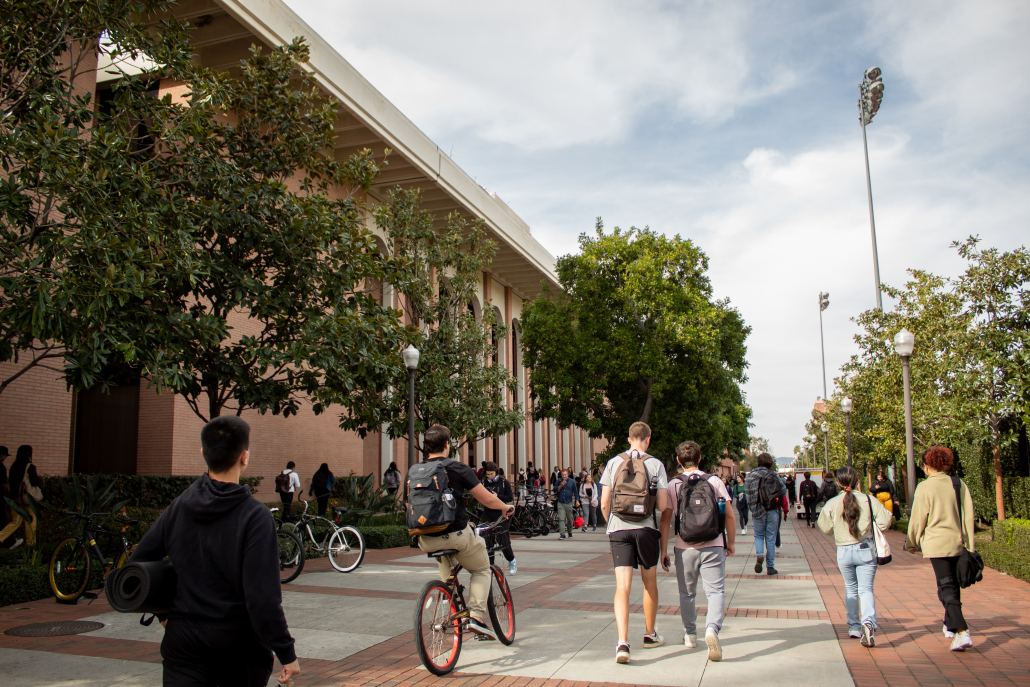Students concerned by new ‘Kraken’ variant

The XBB.1.5 coronavirus subvariant, nicknamed the “Kraken” variant, has some USC students concerned that it may spread because of the lax attitudes and health practices of their peers.
XBB.1.5 is a descendant of the omicron XBB subvariant. It is a combination of two previous BA.2 subvariants, both of which were more transmissible than previous variants. Now, it appears that XBB.1.5 has the potential to be even more transmissible. Surfacing in early November 2022, XBB.1.5 accounts for nearly 30% of coronavirus variants circulating in the United States in the past week, according to the Centers for Disease Control and Prevention.
The variant ravaged the East Coast over Winter Break. Right now, XBB.1.5 makes up 72.7% of coronavirus cases in New Jersey, New York, Puerto Rico and the Virgin Islands, according to the CDC. XBB.1.5 recently made landfall in Southern California.
In an interview with the Los Angeles Times, Paula Cannon, virologist and professor of molecular microbiology and immunology at USC, said XBB1.5 is a new monster altogether, one that has evolved to be even more transmissible than its predecessors.
“It’s just the latest and greatest most infectious variant,” Cannon said. “It’s amazing to me that this virus keeps finding one more trick to make itself even more infectious, even more transmissible.”
Spring semester attitudes, peer pressure and a lack of mask-wearing are among the reasons some students said they are concerned about the XBB.1.5 subvariant.
Ailani Bonilla, a sophomore majoring in geological sciences, said she feels worried about the subvariant, given her immunocompromised status and high risk for long-term complications from the coronavirus.
“I’m a high-risk person. I’ve already gotten [the coronavirus] twice, and it really sucked. I had the omicron variant. I have a lot of high-risk family members, and I go home a lot so I don’t want to give it to them,” Bonilla said. “No one really follows the CDC guidelines anymore.”
L.A County recommends wearing a mask during this winter surge, especially in indoor public settings, businesses, government offices, schools and higher education settings. L.A. County health officials urge people to wear a mask for ten days as they return to school and work.
Kevin Grammling, a sophomore majoring in theater, said he felt that the fear that once kept everyone masked and socially distanced no longer exists, and that many are ignoring health recommendations from public officials.
The freshness of the pandemic in 2020 and the news of impending illness spurred people into action, Grammling said, but people have now grown too comfortable.
“When we bring up [coronavirus], it doesn’t have that same air of catastrophe and tragedy and fear,” Grammling said. “It feels way more normalized and, with that, there’s a level of comfort and although it’s less anxiety-inducing … A lot of people are very quick to get comfortable and feel safe again, and with safety we fall back into our old routines of not wearing a mask and everything.”
At the end of 2021 and beginning of 2022, USC required students to test every week and show their Trojan Checks, a pass obtained after a daily health check quiz. The University has since lifted its coronavirus protocols, no longer requiring weekly surveillance testing and ending its campuswide mask mandate in March.
Santana Vespe, a sophomore majoring in comparative literature and journalism, said that because of the break, many people were bored from staying at home and now are back on campus and anxious to experience college again, making them less likely to wear masks and test frequently.
“There’s that spring semester nihilism that comes over the student body and maybe even the professors,” Vespe said. “It’s like, ‘I don’t care I was just at home for a bunch of weeks and that was dead boring’ or ‘The new year happened, it didn’t change anything, whatever, I’m just going to continue that downward spiral.’”
Now that classes have started, Bonilla said she has noticed a steady trend of people not wearing face masks.
“Even when USC [removed the mask mandate], I still saw a lot of people wearing masks compared to people who weren’t wearing masks,” Bonilla said. “As more people started unmasking, it just became ‘Oh go back to how things were’ and people became less empathetic … Yeah, you should think about yourself, you should be happy, but … sometimes you have to make a sacrifice to take care of others.”

